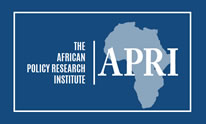INTRODUCTION
The African Policy Research Institute (APRI) is a not-for-profit policy research think tank founded in 2009 and registered in February 2012. APRI seeks to improve the quality of public policy decisions by using an integrated multidisciplinary approach, in research and policy communication. This is premised on the background that development is multidimensional and consists of intricate interconnected elements in a socio-economic system, which must be considered when providing policy options.
In dealing with development challenges, APRI is focused on an integrated approach to development, by framing and analyzing development issues through long-term vision by integrating sectoral dependencies in providing lasting solutions to the development challenges. This approach will ensure that policy options provided to state actors maximize their potential towards the fulfillment of their strategic goals in order to ensure wellbeing of its citizenry.
Multidisciplinary approach at work
Many African countries have undertaken major economic reforms either unilaterally or multilaterally in order to achieve economic stability and improve economic performance that results in improved welfare of the citizenry. Some of these reforms include liberal trade and exchange rate policies, financial sector deregulation, privatization, public sector downsizing among others.
Even with these reforms, development in the continent has remained fragile because of unpredictable weather conditions, exogenously determined factors such as: concentration of production and exports in primary commodities, volatile capital flows, effects of aid conditionality on domestic policy and economic performance, high debt overhang and servicing commitments and domestic factors coupled by poor governance.
A key approach to addressing these challenges faced by Sub Saharan Africa (SSA) is the adoption of a cohesive policy framework that simultaneously confronts these issues using a combination of domain and sectoral actions, that ensure horizontal integration and better coordination by stakeholders at various management levels including the involvement of non-state actors in the implementation of public interventions that ensures vertical integration.
Even though this approach remains weak in most SSA countries, its adoption will safeguard maximum synergies of different environments working together and actions that are based on long-term forecasts and far- sighted evidence-based policies. It is expected that to enable SSA countries achieve the Sustainable Development Goals (SDGs) amidst competing resources. APRI seeks to assist in bridging this gap by first providing policy research that seeks to incorporate interactions of different sectors in its analytical work for actionable policy options.
